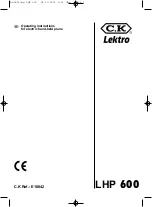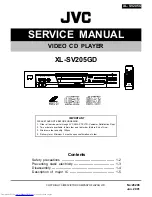
6
cord.
Contact with a “live” wire will make exposed metal parts of the tool
“live” and shock the operator.
2.
Secure the material being planed. Never hold it in your hand or across
legs.
A small workpiece must be adequately secured so that the rotating
planer blades will not pick it up during forward motion of the planer.
Unstable support can cause the blades to bind, causing loss of control
and injury.
3.
Always start the planer and allow the blade to come to full speed before
the blade is in contact with the workpiece.
The tool can vibrate or chatter
if the blade speed is too slow at the beginning of the cut and could possibly
kickback.
4.
Check the workpiece for nails.
If there are nails, either remove or set them
well below the intended finished surface. If the planer blades strike objects
like nails they may cause the tool to kickback, and serious personal injury
may result.
5.
Never leave the trigger locked “ON”. Unplug the planer before changing
accessories. Before plugging the tool in, check that the trigger lock is
“OFF”.
Accidental start-ups may occur if the planer is plugged in while
changing an accessory.
6.
After changing blades, rotate the blade drum to make sure that blades
are not hitting any part of the blade-head housing and that the blade-
locking screws are tight.
Spinning blades could strike the tool housing and
damage the tool as well as possibly causing injury.
7.
Always hold the tool firmly with both hands for maximum control.
8.
Never pull the plane backward over the workpiece.
Loss of control may occur.
9.
Do not put fingers or any objects into the chip ejector or clean out chips
while the tool is running.
Contact with the blade drum will cause injury.
10.
Remove the plug from the power source if it becomes necessary to
remove chips.
The blades are hidden from view and you may be cut if the
blade is contacted.
11.
Never place the plane down until the blade has stopped completely.
Surface contact with a coasting blade drum may cause the plane to walk
out of control.
12.
Never use dull or damaged blades. Sharp blades must be handled with
care.
Damaged blades can snap during use. Dull blades require more
force to push the tool, possibly causing the blade to break.
13.
Always wear safety goggles, respiration mask, and ear protection.


































